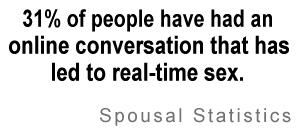 This excerpt from an interview with Martha Stout was so good we are reposting it here. Many of these rules can be applied to relationships with cyberpaths, online bullies or predators.
This excerpt from an interview with Martha Stout was so good we are reposting it here. Many of these rules can be applied to relationships with cyberpaths, online bullies or predators.
In our opinion, Cyberpaths are at their cores Destructive Narcissists & SociopathsRead & heed! - EOPC
Twelve Rules
by Martha Stout
Author of THE SOCIOPATH NEXT DOOR.
1 - The first rule involves the bitter pill of accepting that some people literally have no conscience, and that these people do not often look like Charles Manson or a Ferengi bartender. 2 - In a contest between your instincts and what is implied by the role a person has taken on -- educator, doctor, leader, animal-lover, humanitarian, loving parent, activist, religious person -- go with your instincts. Whether you want to be or not, you are a constant observer of human behavior, and your unfiltered impressions, though alarming and seemingly outlandish, may well help you out if you will let them. Your best self understands, without being told, that impressive and moral-sounding labels do not bestow conscience on anyone who did not have it to begin with. 3 - When considering a new relationship of any kind, practice the Rule of Threes regarding the claims and promises a person makes, and the responsibilities he or she has.Make the Rule of Threes your personal policy. One lie, one broken promise, or a single neglected responsibility may be a misunderstanding instead. Two may involve a serious mistake. But three lies says you're dealing with a liar, and deceit is the lynchpin of conscienceless behavior.
Cut your losses and get out as soon as you can. Leaving, though it may be hard, will be easier now than later, and less costly.Do not give your money, your work, your secrets, or your affection to a three-timer. Your valuable gifts will be wasted.
4 - Question authority.Once again -- trust your own instincts and anxieties, especially those concerning people who claim that dominating others, violence, war, or some other violation of your conscience is the grand solution to some problem. Do this even when, or especially when, everyone around you has completely stopped questioning authority.
Recite to yourself what Stanley Milgram taught us about obedience. 'At least six out of ten people will blindly obey a present, official-looking authority to the bitter end.' The good news is that having social support makes people somewhat more likely to challenge authority.Encourage those around you to question, too.5 - Suspect flattery. Compliments are lovely, especially when they are sincere. In contrast, flattery is extreme, and appeals to our egos in unrealistic ways. It is the material of counterfeit charm, and nearly always involves an intent to manipulate. Manipulation through flattery is sometimes innocuous and sometimes sinister. (i.e. Love Bombing done by Cyberpaths)
This "flattery rule" applies on an individual basis, and also at the level of groups and even whole nations. Throughout all of human history and to the present, the call to war has included the flattering claim that one's own forces are about to accomplish a victory that will change the world for the better, a triumph that is morally laudable, justified by its humane outcome, unique in human endeavor, righteous, and worthy of enormous gratitude. Since we began to record the human story, all of our major wars have been framed in this way, on all sides of the conflict, and in all languages the adjective most often applied to the word war is the word holy. An argument can easily be made that humanity will have peace when nations of people are at last able to see through this masterful flattery.6 - If necessary, redefine your concept of respect. Too often, we mistake fear for respect, and the more fearful we are of someone, the more we view him or her as deserving of our respect.I have a spotted Bengal cat who was named Muscle Man by my daughter when she was a toddler, because even as a kitten he looked like a professional wrestler. Grown now, he is much larger than most other domestic cats. His formidable claws resemble those of his Asian leopard-cat ancestors, but by temperament, he is gentle and peace-loving. My neighbor has a little calico who visits. Evidently the calico's predatory charisma is huge, and she is brilliant at directing the evil eye at other cats. Whenever she is within fifty feet, Muscle Man, all fifteen pounds of him to her seven, cringes and crouches in fear and feline deference.Muscle Man is a splendid cat. He is warm and loving, and he is close to my heart. Nonetheless, I would like to believe that some of his reactions are more primitive than mine.
I hope I do not mistake fear for respect, because to do so would be to ensure my own victimization. Let us use our big human brains to overpower our animal tendency to bow to predators, so we can disentangle the reflexive confusion of anxiety and awe. In a perfect world, human respect would be an automatic reaction only to those who are strong, kind, and morally courageous. The person who profits from frightening you is not likely to be any of these.The resolve to keep respect separate from fear is even more crucial for groups and nations. The politician, small or lofty, who menaces the people with frequent reminders of the possibility of crime, violence, or terrorism, and who then uses their magnified fear to gain allegiance is more likely to be a successful con artist than a legitimate leader. This too has been true throughout human history. (This applies to Cyberpaths who apply the 'if you do...., then I will...." to keep you silent about the truth about them. Or who threaten to tell your friends, coworkers or hurt your family & friends. This includes those who defame and libel your reputation to people who don't even know you and rewrite history in their favor!)7 - Do not join the game.Intrigue is a sociopath's tool. Resist the temptation to compete with a seductive sociopath, to outsmart him, psychoanalyze, or even banter with him.
In addition to reducing yourself to his level, you would be distracting yourself from what is really important, which is to protect yourself.
8 - The best way to protect yourself from a sociopath is to avoid him, to refuse any kind of contact or communication.The only truly effective method for dealing with a sociopath you have identified is to disallow him or her from your life altogether. Sociopaths live completely outside of the social contract, and therefore to include them in relationships or other social arrangements is perilous. Begin this exclusion of them in the context of your own relationships and social life.
You will not hurt anyone's feelings. Strange as it seems, and though they may try to pretend otherwise, sociopaths do not have any such feelings to hurt.You may never be able to make your family and friends understand why you are avoiding a particular individual. Sociopathy is surprisingly difficult to see, and harder to explain. Avoid him/ her anyway.If total avoidance is impossible, make plans to come as close as you can to the goal of total avoidance.9 - Question your tendency to pity too easily.Respect should be reserved for the kind and the morally courageous. Pity is another socially valuable response, and should be reserved for innocent people who are in genuine pain or who have fallen on misfortune. If, instead, you find yourself often pitying someone who consistently hurts you or other people, and who actively campaigns for your sympathy & compassion, the chances are close to one hundred percent that you are dealing with a sociopath.Related to this-- I recommend that you severely challenge your need to be polite in absolutely all situations. For normal adults in our culture, being what we think of as "civilized" is like a reflex, and often we find ourselves being automatically decorous even when someone has enraged us, repeatedly lied to us, or figuratively stabbed us in the back. Sociopaths take huge advantage of this automatic courtesy in exploitive situations.Do not be afraid to be unsmiling and calmly to the point.
10 - Do not try to redeem the unredeemable.Second (third, fourth, and fifth) chances are for people who possess conscience. If you are dealing with a person who has no conscience, know how to swallow hard and cut your losses.At some point, most of us need to learn the important if disappointing life lesson that, no matter how good our intentions, we cannot control the behavior -- let alone the character structures -- of other people. Learn this fact of human life, and avoid the irony of getting caught up in the same ambition he has-- to control.If you do not desire control, but instead want to help people, then help only those who truly want to be helped. I think you will find this does not include the person who has no conscience.The sociopath's behavior is not your fault, not in any way whatsoever. It is also not your mission. Your mission is your own life.
11 - Never agree, out of pity or for any other reason, to help a sociopath conceal his or her true character."Please don't tell," often spoken tearfully and with great gnashing of teeth, is the trademark plea of thieves, abusers -- and sociopaths. Do not listen to this siren-song. Other people deserve to be warned more than sociopaths deserve to have you keep their secrets. (i.e. - EXPOSURE WORKS!)If someone without conscience insists that you "owe" him or her, recall what you are about to read here -- that "You owe me" has been the standard line of sociopaths for thousands of years, quite literally, and is still so. It is what Rasputin told the Empress of Russia. It is what Hannah's father implied to her, after her eye-opening conversation with him at the prison.We tend to experience "You owe me" as a compelling claim, but it is simply not true. Do not listen.
Also, ignore the one that goes, "You are just like me." You are not.
12 - Defend your psyche.Do not allow someone without conscience, or even a string of such people, to convince you that humanity is a failure. Most human beings do possess conscience. Most human beings are able to love.








